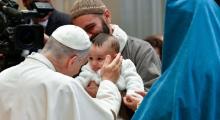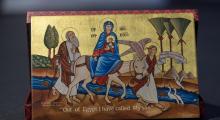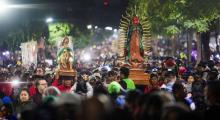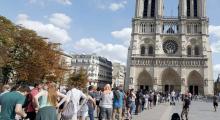Issued by the Catholic Center for Studies and Media - Jordan. Editor-in-chief Fr. Rif'at Bader - موقع أبونا abouna.org
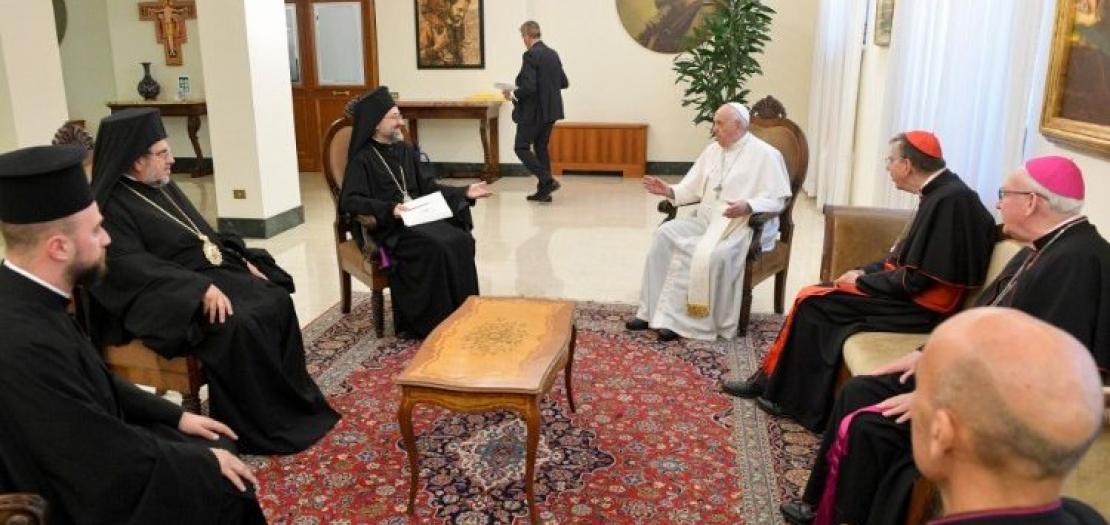
Amid "a cruel and senseless war of aggression in which many, many Christians are fighting one another," Pope Francis says "reconciliation among separated Christians as a means of contributing to peace between peoples in conflict" is very timely.
The Holy Father made that point on Thursday, June 30, when meeting with a delegation of the Ecumenical Patriarchate of Constantinople in the Vatican, the day after the Feast of Saints Peter and Paul.
Following a long-standing tradition, the delegation is in Rome this week to help build unity between the Catholic and Orthodox Churches.
The visit comes as part of the “traditional exchange of delegations for the respective feasts of the Patron Saints: 29 June in Rome for the celebration of the Holy Apostles Peter and Paul and 30 November in Istanbul for the celebration of St. Andrew the Apostle."
The Pope welcomed them this morning, saying he was grateful for their visit, and asked them to convey his greetings to his "dear brother" Ecumenical Patriarch Bartholomew and to the Holy Synod.
Recalling their presence at Wednesday's Eucharistic liturgy, the Pope told them their presence "was a source of great joy" for him and for all present, saying it visibly manifests "the closeness and fraternal charity of the Church of Constantinople towards the Church of Rome."
Commitment to advancement toward full communion
The Holy Father noted that the traditional exchange of delegations between the two Churches for the celebration of their respective patronal feasts "is a tangible sign that the days of distance and indifference, when our divisions were considered irreparable, is long past."
Reflecting on those who initiated this process, the Pope recalled "the unforgettable Ecumenical Patriarch Athenagoras," as the 50th anniversary of his death approaches, "a wise and courageous pastor who continues to be a source of inspiration for me and for many others."
"It was he, who spoke of 'Sister Churches, Brother Peoples,'” the Pope said.
Sister Churches, Brother Peoples
The Holy Father highlighted the need for Christians to reconcile amid the torment of war.
Before "the scandal of war," the Pope said, our concern must not be for talking and discussing, but for weeping, for helping others and for experiencing conversion ourselves.
"We need to weep for the victims and the overwhelming bloodshed, the deaths of so many innocent people, the trauma inflicted on families, cities and an entire people."
"How much suffering," he decried, "has been endured by those who have lost their loved ones and been forced to abandon their homes and their own country!"
He said we need to help "our brothers and sisters" and "exercise that charity which, as Christians, we are obliged to show towards Jesus, present in the displaced, the poor and the wounded."
Jesus and armed conquest have nothing to do with Lord's Kingdom
He stressed these tendencies have "nothing to do with the Risen Lord, Who in Gethsemane told His disciples to reject violence, to put the sword back in its place, since those who live by the sword will die by the sword, and Who, cutting short every objection, simply said: 'Enough!'"
Seeking Christian unity, the Pope said, "is not merely a question internal to the Churches," but rather an essential condition for the realization of an authentic universal fraternity, manifested in justice and solidarity towards all."
"It calls for serious reflection on the part of us Christians," he said.
Starting anew in Christ
Pope Francis called on those with him to reflect on several questions.
"What kind of world do we want to emerge in the wake of this terrible outbreak of hostilities and conflict? And what contribution are we prepared to make even now towards a more fraternal humanity?"
As believers, he said, "we must necessarily find the answers to these questions in the Gospel: in Jesus, who calls us to be merciful and never violent, to be perfect as the Father is perfect, and not be conformed to the world."
Pope Francis encouraged, "Let us help one another, dear brothers, not to yield to the temptation to muffle the explosive newness of the Gospel with the seductions of this world." And not to turn the Father of all, 'who makes his sun rise on the evil and on the good, and sends rain on the righteous and the unrighteous', into the god of our own ideas and our own nations."
"Christ is our peace," the Pope said, noting that by "His Incarnation, Death and Resurrection for all; He has torn down the walls of enmity and division between people." He said let us start anew from Him.
Sign of Hope
The Pope observed as a sign of hope in the journey towards the restoration of full communion, the meeting of the Coordinating Committee of the Joint International Commission for Theological Dialogue between the Catholic Church and Orthodox Church, which, after an interruption of two years due to the pandemic, took place in May.
"It is my hope that the theological dialogue will progress by promoting a new mentality," he said, saying: "Let us pray for one another, work with one another and support one another by looking to Jesus and His Gospel."
Pope Francis concluded by praying, "May the holy brothers Peter and Andrew intercede for us and obtain the blessing of God, the Good Father, upon our journey together and upon the entire world."



